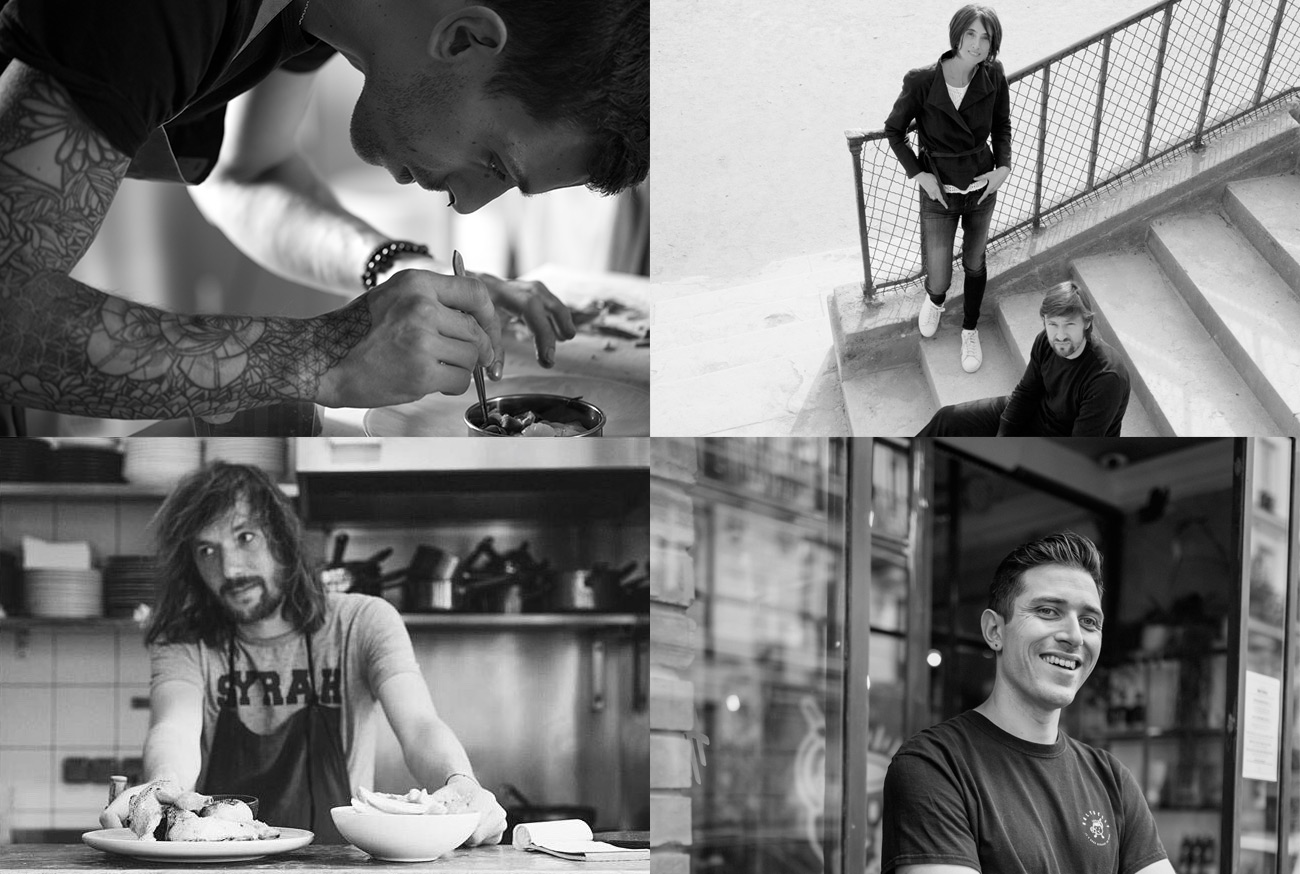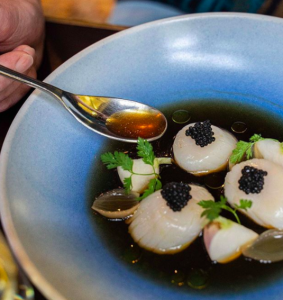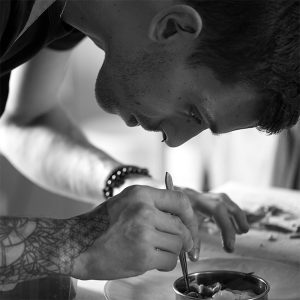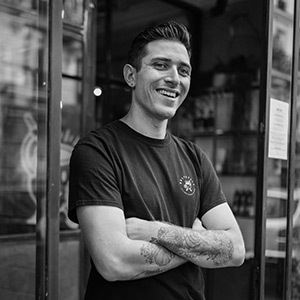
These Chefs Now Cook for Healthcare Workers in Paris
On March 16th, the French President Emmanuel Macron announced that France was at war with the novel coronavirus and imposed a countrywide thirty-day quarantine. At the same time, various associations launched public-support initiatives in Paris, to provide assistance to those most impacted by these events. One of the biggest is Les chefs Avec Les soignants (“The Chefs with the Health Workers”), started by the chef of the Elysees Palace, Guillaume Gomes, and the food journalist Stéphane Méjanès. The Vivid Minds talked with French chefs and owners of cafés and restaurants to learn how they are dealing with the crisis and embracing French solidarity during the pandemic.
I was at my restaurant when Macron imposed a national quarantine, so I took two minutes outside to digest and think about the news. As I came back, I told the staff that we had to use everything we had in stock—there was no way we would throw any of our food supplies. I approached guests at the restaurant and asked them what their budget was; I wanted to offer them something off the menu. We went from thirty to ninety guests in an hour, and after that we just closed the restaurant.
I live in downtown Paris, in a thirty-five-square-meter flat, not far from the infamous Bataclan. It’s unusual to be stuck within four walls in a tiny bedroom, but, since the first day of quarantine, I’ve tried to occupy myself—cleaning the flat, speaking with friends, reading a biography of Alexandre Couillon, the chef of La Marine, a two Michelin-starred restaurant.
Normally I eat at my restaurant, but since the lockdown I’ve been buying groceries and cooking at home. I used to work with fresh, quality products, and now I only buy from suppliers and farmers directly, which is complicated and costly: prices have doubled, especially for vegetables and fish. I’ve also started to have pain in my limbs because of the lack of physical activity.

Recently, I received a message to join the Les chefs Avec Les soignants initiative, a project that aims to provide hot meals, made by real chefs, to hospital workers. It has found essential partners in France—Metro, Rungis and TransGourmet—which enables them to have a bit of everything, including meat, dry goods, veggies, etc.
At Les chefs Avec Les Soignants, I cook with my friend, the chef Francois Merle, of the Mova restaurant in Paris. The project brings food to hospital workers twice a week, on Wednesdays and Sundays, which we cook the day before. We make food that they can keep in the fridge for a few days and put in the microwave whenever they need.
We always try to cook something special. Yesterday, we prepared a three-course menu: rice salad with fresh pesto with peas and feta for the starter, a duck Parmentier with garlic, parsley and crispy toasted bread for the main course, and a Catalan cream with candied orange and caramel coulis for dessert. Next week, I will cook for the association J’ai Besoin de, which supplies five hospitals in the Parisian region.
We want to support the medical personnel who are working without any weekends or holidays right now, but this project is also an excellent way to spend our time and forget what we’re all dealing with. This may be the first time that we chefs can, or have to, live day by day, without thinking much: we can’t prepare a menu for our restaurants, because we don’t know when we will reopen.
Like most high-end restaurants, Mensae works with seasonal and local ingredients, so our menus may differ from month to month. The shutdown fell on the best season: in April we have peas, asparagus, beans, green vegetables, and lots of wildflowers. It’s the time when terraces open, when people go out.
I know that soon, once we start working, the restaurant will be full—I get messages every day with support from our regulars. The day it’s over, I will take my scooter and ride as fast as I can to the restaurant, to my kitchen, and I’ll work on the menu with incredible pleasure.
I was at home with my girlfriend Joulia when Macron announced the lockdown. Frankly speaking, I was not prepared for this crisis, and I don’t have any savings. At this moment, nobody knows how long it will last. I worry about the financial side of the business — how we will pay our employees, suppliers or the rent. I run two places – gastro bistro Le Galopin and wine and tapas bar La Cave à Michel.
We have six employees on payroll, and the French government will cover 84% of their wages. However, we have not received the money yet. We expect to be closed for about two months, but obviously when we finally re-open we won’t double our revenue. The government offers a solution (0% credit for small businesses), but it doesn’t suit everybody. We would have too much debt to repay. My restaurant has existed for nine years, but this is the first time I have experienced anything like this.
To stay busy, I joined the initiative Les chefs Avec Les Soignants created by Stéphane Méjanès and Guillaume Gomez. All the participating chefs and suppliers volunteered to express their gratitude to healthcare workers, to comfort them with food is the smallest thing we can do.

It also feels like the restaurant is not dead. It’s hard for me to see it so empty. When I cook with my friend and my girlfriend, we try to have a good time and to cheer each other up. We recently cooked for The Saint-Denis Hospital, and before that it was for The Rives Seine Hospital.
Tip Toque (a high-end service created in 2015 by French chefs Marie Giordano, Thomas Bouvier and Edwy Rousseau to deliver food from Parisian Michelin restaurants to corporate clients without losing quality and plate presentation – ed.) prepares all the logistics and delivers the food. We work with protection masks, gloves, and we avoid direct contact with the plate or the food, but it is normal for a chef to be meticulous about hygiene.
People should try to support local businesses. Many of them are currently in a critical situation. Le College Culinaire de France prepared an interactive map where you can see the cafes and food artisans in your district who offer delivery. It’s better quality food than in supermarkets, and for some, it’s a question of survival.
I am looking forward to reopening my restaurant and inviting friends over for a drink and good food. I miss hearing the chatter and laughter on the terraces and in the rooms so much.
We have ninety employees in seven cafes in Paris. We were still working in the office with my team when the confinement was declared. First, delivery was authorized, so we continued to operate for a few days after the announcement. But later, we closed as people were worried, and preferred to stay at home even if we prepared food with all the necessary devices such as masks, gloves, and sanitizers. I’m not sure about our foreseeable recovery. We are still in start-up mode, and we don’t have much cash reserved.
Just before the confinement, we had done catering for Paris fashion week (24 Feb – 3 Mar), for presentations and showrooms for fashion brands. At that time, we had already experienced financial loss because many brands from Italy and other countries did not show up.
Until our final closure, we were giving food to homeless people, hospitals and customers. We also started some initiatives to help overcome these hard times, by providing positivity to our customers, our “tribe,” as we call it. We launched Instagram-wise yoga classes, meditation, online cooking classes, and wellbeing talks with our friends. Participation is always free, but some teachers suggest donations which go to French hospitals.
Our DNA is an environment friendly and responsible approach towards nature and what it gives to us. At the moment, we have time to think about how we will act when this is all over, and to reconsider our way of living and consuming.

We used to criticize the French government, but it offered help to small businesses. However, in Dubai, where we have two cafes, there is no such thing as unemployment paid by the state, and we have to figure out how to protect our employees. Some of them are in a very precarious situation. We don’t want to put them out on the streets, so we are looking for ways to pay wages, even if we pay less. Solidarity is what we need most amidst this crisis.
Now is a good time to reconsider our habits and lifestyle. We have to adopt a local, fresh, healthy and plant-based diet, which is also better for the environment. Regarding the business, we are trying to digitize our operations as much as we can, to perfect the list of options, maybe keep our menu small, but provide consistency to meet the demands, and be accessible to more customers.
We hope to partially reopen in June, in a time of this major economic turmoil. I’m just not sure we will be able to bounce back.
I was going out for pizza with my wife Sarah and my son when the news of the lockdown bumped into me. All restaurants had to close on that very day at midnight, just five hours later! We knew that COVID-19 was getting bigger, but we kept rolling, trying to do the best we can, until the 15th of March when we had to shut down.
On Sunday, our first day of being closed, we gathered our managers and counted all the food we had – 600 meals – and gave it all away. We opened the doors, set up tables, and let people come in. There was no interaction, respecting social distancing, and in two hours we served about 10 thousand euros worth food which we couldn’t keep. Two of our chefs now cook for hospitals in Paris – they use the kitchen of one of our facilities and we supply them with material. They cook about fifty meals a day. Now I’m trying to set up a paid consulting service, so that I can donate the profits to people in need.
By now everything has changed! My wife and I usually work from early morning until late at night. We run two restaurants with a team of 32 people. We are lucky that we have a nice house outside of Paris, so we spend our confinement here. The main challenge is uncertainty: when, how and for how long will life be different? I work from home collecting paperwork to get the government’s help and insurance. We have a strong online presence, and we try to maintain the relations with the community, so I also spend up to three hours a day on social media. People around us are very supportive too, asking how they can help. We are not providing delivery, because we think it’s not fair for the delivery guys to be exposed to the potential danger and be so poorly paid.

Chefs are trying to pull through together. We want to be sure that everybody is going to make it through because we like each other, and we like each other’s restaurants, so we help by sharing information and giving advice to each other.
Usually, I’m the first in line to complain about the taxes we pay, but now when I look at the US where people are losing their business overnight and millions are losing their jobs, I feel that our government is really supportive. Employees will get 84 percent of their net salary during the period they are not working, for instance. I estimate our financial loss at about 200-250K euros. Holybelly is a big machine, and we have things to pay for. We can manage for now, but if this lasts much longer, we will run out of money. Right now we have to sit tight and wait until the 15th of April. I’m dying to go back to work. We have been creating various things with maple syrup. And, one of our suppliers in Canada is continuously inviting us to come visit. Now I’m thinking about finally doing this trip!



